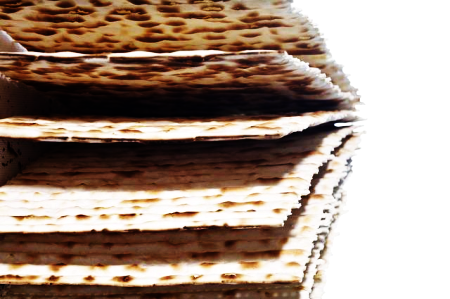“Here is the bread of affliction eaten by our forefathers in the land of Egypt” (Passover Haggadah). When we reside in our ego, we eat the “bread of affliction of the pauper” because we are beggars in relation to spirituality and receive only a tiny bit of Light, a minimal spark of life (Kista de Hayuta) or so-called “faint illumination” (Ner Dakik) that brings to life all of our world.
It is not the “bread” eaten in Egypt. In Egypt, there is lots of food. Our ego gives us everything: Please, do enjoy! However, as soon as we start desiring the spiritual world, long before exiting egoistic “Egypt,” we start tasting the “bread of affliction” since we don’t understand how one can reach bestowal and what good is in it.
I don’t taste any flavor in it. Everything is dry and insipid as this simple cracker made of only flour and water. That is how the spiritual world that I am walking to looks to me. Do I have to flee the prosperous Egypt, all the pleasure-pots filled with fish and meat, rich and delicious, in order to live on the bread of affliction in the desert? Is that what I yearn for?
However, it is indeed so. This is why it is written that “the commandment to eat unleavened bread (Matzot, the bread of affliction) was given to the sons of Israel long before their exodus from Egypt as a symbol of liberation that will come to pass in haste.”
“In haste” means that otherwise it is impossible to exit egoism. Spirituality looks so unattractive and repulsive that exiting into it must be rushed due to the aggressive, external force pulling from egoism. I, myself, am unable to step out of this marvelous world as it seems to me in my egoistic desire.
As for the spiritual world, it seems pitch black darkness to my ego. There is nothing attractive for my egoism there, and I don’t want to see it. Hence, the escape can be made only “in haste”; I am thrown out of there abruptly. Let’s hope the same will be done with us. [Source: Dr. Michael Laitman, “Your Own Passover Haggadah“]
The Spiritual Meaning of the Exodus from Egypt
“Here is the bread of affliction eaten by our forefathers in the land of Egypt” (Passover Haggadah). It follows that the Mitzva (commandment) of eating a Matza (unleavened bread) was given to them while they were still enslaved, and the aim of the Mitzva was for the time of redemption since then they departed in haste. –Baal HaSulam, article “This Is for Judah”
This always occurs when we transition from state to state, leaving the degree we are presently in, i.e. the Egyptian bondage, ruled by our ego, Pharaoh, our stubborn “evil inclination” that holds us hostage and doesn’t let us rise above our jealousy, hatred, lust and ambition.
Try as we might, we still can’t rise above these egoistic properties and bond ourselves with each other with ties that correspond to the degree following the exodus from Egypt. We are still unable to become “as one man with one heart,” achieve mutual guarantee so that the integral force of love and bestowal regarded as the Creator would become revealed.
Therefore, while we are still enslaved by Pharaoh, we need to visualize the next state, to play a “make believe adult life,” i.e. a spiritual life, like children play being adults when they grow up. [Source: Dr. Michael Laitman, “A Meal in Honor of the Spiritual Life“]
Why Was the Mitzva of Eating Matza Given in Advance of the Exit from Egypt?
The Mitzva about eating Matza was given in advance because the Exodus from Egypt happened suddenly, in haste. Suddenly the order came: “In another moment go!,” “And what about the bread, how is it possible to leave without bread?”
So the Mitzva was given in advance to prepare everything so that at the moment of the Exodus, the escape, we would have everything necessary. Even now we are doing this because we are very happy about this, that all of the redemptions happen suddenly. Therefore, we are in hope all the time that at every moment the redemption could come.
Just as they said to them in Egypt: “You are leaving now!” that is what they will say to us today; indeed in a little while there will be a proclamation and we will all go out; we will begin to rise to the level of the redemption. Therefore we are so happy to celebrate this holiday, remembering this miracle every year. [Source: Dr. Michael Laitman, “You Are Leaving Now“]
What Does it Mean to Exit Egypt in Haste?
Haste is when I don’t know from the start that I am approaching redemption. Even though at each and every moment I direct myself towards wanting to go out, in spite of it this, it happens to me suddenly. This is because this happens according to a calculation from above, according to relationships between Kelim (vessels) and Lights.
Therefore I cannot predict this from the start. This is not under my control. They don’t tell me all of the conditions that must be realized in me in order to create the right state for the next level called redemption.
This is not known to me from the start. I search and search, but I am still in the dark. I don’t know what exactly it is to bestow to this higher level. Therefore this is called escaping in haste.
It is so pleasant for us to celebrate this sudden salvation precisely because we hope that this will come at any moment. [Source: Dr. Michael Laitman, “Be Ready to Escape at Any Moment“]
To learn more about how Kabbalah describes holidays and many other concepts at their root level, before they dress into the material world, it is recommended to take the Free Kabbalah Course. The reason is that many of the concepts and terms we have heard a lot about in our upbringing have completely different definitions in Kabbalah, and it takes a while to process them properly. Therefore, if you’re interested in this topic, then we recommend taking the free course and start learning about the world around you and inside you anew. Click the banner below to sign up for the free course …


